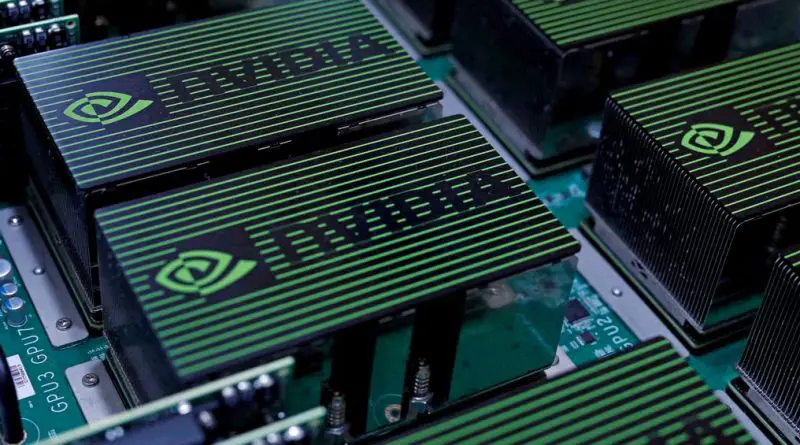With Latest US Chip Ban, China’s AI Castle Could Be Built on Nvidia Sand
ByteDance’s enterprise cloud service, Volcengine, has reduced the training time for an image-recognition, artificial intelligence (AI) model from 5 days to 3 days; Alibaba Cloud’s Sinian computing platform has surpassed a Google-held record by recognizing 1.078 million images per second in offline scenarios; and China’s largest server manufacturer Inspur’s NF5488A5 model has been hailed as a world-class product in medical image segmentation, speech.
However, none of these achievements by China’s most powerful technology players would be possible without the powerful graphic processing units provided by Nvidia Corp, the Santa Clara, California-based GPU giant that has played a pivotal role in powering China’s progress in AI, data analysis, and computing power.
According to industry insiders and tech analysts, the US government’s abrupt decision last month to prohibit Nvidia from selling its two most advanced chips, the A100 and the upcoming H100, to clients in China has caused jitters across China’s AI, cloud computing, and smart vehicle sectors, as there is no immediate substitute for the Nvidia GPUs that train AI models for autonomous driving, semantic analysis, image recognition, weather variables, and big data analysis.
The full impact of Washington’s latest ban on chip technology on China’s downstream industries is still unknown. Nvidia has stated that it is attempting to mitigate the impact on Chinese clients by replacing advanced GPUs with products that do not require US licensing.
A number of Chinese GPU firms have expressed hope that the ban will allow them to win over former Nvidia clients now that US-made chips are no longer available. However, the psychological impact of this targeted US measure on Chinese policymakers and investors is easy to detect.
At a key meeting this month, President Xi Jinping emphasized that China must accelerate the development of critical national security technology and implement a top-down “new whole country system” to achieve breakthroughs. The summary of Xi’s remarks made no mention of semiconductors or the latest GPU restrictions imposed by the United States.
He Xiaopeng, the founder of Xpeng, one of China’s largest electric vehicle manufacturers, stated on his social media account that the Nvidia chip ban would be bad news for cloud-based autonomous driving training, but would not have a significant impact on Xpeng because it has already purchased the advanced chips it requires in sufficient quantity for the coming years. According to dealers, there will be a scramble for Nvidia chips from Chinese clients.
According to a Shanghai-based sales manager at VSTECS Holdings, China’s second-largest telecommunications equipment, and cloud service distributor, all Chinese clients will begin stockpiling affected chips before the ban goes into effect. Nvidia says it will continue to ship AI chips from its Hong Kong facility until September 2023.
“Most cloud service providers in China use Nvidia chips in their GPU-based products,” said the manager, who requested anonymity because he is not authorized to speak with the media. “If this hardware is prohibited from being shipped to China, GPU-based cloud resources will be in short supply, with significant consequences,” he added.
The majority of China’s cloud providers, including Alibaba Cloud (owned by Alibaba Group Holding), Tencent Cloud (owned by Tencent Holdings), and Baidu Cloud, have used chips from other vendors to power their cloud infrastructure, including Intel and AMD. Many cloud servers are powered by central processing units (CPUs) based on Intel’s x86 or Arm architecture.
However, Nvidia’s A100, which was released in 2020, and the TSMC-manufactured H100, which is expected to be available in the second half of this year, have advantages in handling massive, parallel threads of computation. Nvidia’s GPUs have thousands of cores, compared to Intel and AMD’s multiple-core CPUs, making them ideal for machine learning and deep learning AI models.
Nvidia’s data center business, which includes sales of the two advanced chips, is one of the company’s fastest-growing units, with US$3.8 billion in sales in the fiscal quarter that ended July 2022, representing a 61% year-on-year increase.
With nearly one million businesses claiming to be related to AI, China has become a “very large market” for Nvidia, according to its founder and CEO Jensen Huang, a Taiwanese American entrepreneur who is widely respected in China. Nvidia’s market capitalization is now roughly three times that of Intel, thanks in part to Chinese demand for its chips. China accounts for roughly a quarter of total Nvidia sales in gross terms, and the maximum third-quarter sales losses from the latest US government ban are estimated to be around $400 million, according to the company.



